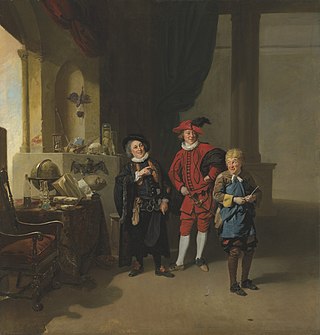Related Research Articles

James Shirley was an English dramatist.
This article presents lists of the literary events and publications in 1633.

The Alchemist is a comedy by English playwright Ben Jonson. First performed in 1610 by the King's Men, it is generally considered Jonson's best and most characteristic comedy; Samuel Taylor Coleridge believed that it had one of the three most perfect plots in literature. The play's clever fulfilment of the classical unities and vivid depiction of human folly have made it one of the few Renaissance plays with a continuing life on stage, apart from a period of neglect during the Victorian era.
The Coronation is a Caroline era stage play, a tragicomedy written by James Shirley, and notable for the tug-of-war of authorship claims in which it was involved in the middle seventeenth century.

A Fair Quarrel is a Jacobean tragicomedy, a collaboration between Thomas Middleton and William Rowley that was first published in 1617.
Love Tricks, or The School of Complement is a Caroline stage play by James Shirley, his earliest known work.
The Ball is a Caroline comedy by James Shirley, first performed in 1632 and first published in 1639.
The Brothers is a Caroline era stage play, a comedy written by James Shirley. First published in 1652, The Brothers has sometimes been hailed as one of Shirley's best plays, though it has also been a focus of significant confusion and scholarly debate.
The Humorous Courtier, also called The Duke, is a Caroline era stage play, a comedy written by James Shirley, first published in 1640.
The Example is a Caroline era stage play, a comedy written by James Shirley, first published in 1637. The play has repeatedly been acclaimed both as one of Shirley's best comedies and one of the best works of its generation. And it provides one of the clearest demonstrations in Shirley's canon of the influence of the works of Ben Jonson on the younger dramatist's output.
Honoria and Mammon is a Caroline era stage play by James Shirley, first published in 1659 though not produced until 2013. It is a revision and expansion of Shirley's earlier morality play A Contention for Honor and Riches, and illustrates the persistence of influence of archaic forms of drama through the final phase of English Renaissance theatre.
The Contention of Ajax and Ulysses for the Armour of Achilles is a Caroline era stage play, an interlude written by James Shirley and first published in 1659. As its title indicates, the subject of the play is a staple of the classical literature; Shirley most likely drew upon Book 13 of the Metamorphoses of Ovid as his direct source, along with Thomas Heywood's play The Iron Age.
Cupid and Death is a mid-seventeenth-century masque, written by the Caroline era dramatist James Shirley, and performed on 26 March 1653 before the Portuguese ambassador to Great Britain. The work and its performance provide a point of contradiction to the standard view that the England of Oliver Cromwell and the Interregnum was uniformly hostile to stage drama.
The Triumph of Beauty is a Caroline era masque, written by James Shirley and first published in 1646. The masque shows a strong influence of Shakespeare's A Midsummer Night's Dream.
The Grateful Servant is a Caroline era stage play, a tragicomedy written by James Shirley, and first published in 1630. Its publication marked a significant development in Shirley's evolving literary career.
The Court Secret is a Caroline era stage play, a tragicomedy written by James Shirley, and first published in 1653. It is generally regarded as the final play Shirley wrote as a professional dramatist.
The Gentleman of Venice is a Caroline era stage play, a tragicomedy written by James Shirley, and first published in 1655.
The Maid's Revenge is an early Caroline era stage the play, the earliest extant tragedy by James Shirley. It was first published in 1639.
The Parliament of Love is a late Jacobean era stage play, a comedy written by Philip Massinger. The play was never printed in the seventeenth century, and survived only in a defective manuscript – making it arguably the most problematical work in the Massinger canon.
The Honest Man's Fortune is a Jacobean era stage play, a tragicomedy written by Nathan Field, John Fletcher, and Philip Massinger. It was apparently the earliest of the works produced by this trio of writers, the others being The Queen of Corinth and The Knight of Malta.
References
- Forsythe, Robert Stanley. The Relations of Shirley's Plays to the Elizabethan Drama. New York, Columbia University Press, 1914.
- Nason, Arthur Huntington. James Shirley, Dramatist: A Biographical and Critical Study. New York, 1915; reprinted New York, Benjamin Blom, 1967.